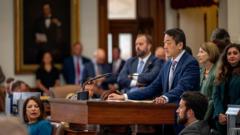Texas legislators have recently greenlit a new electoral map that significantly benefits Republican candidates as they prepare for the upcoming U.S. House elections. This decision came after a tense vote in the Texas House of Representatives, where Republicans secured an 88-52 victory to create five additional Republican-leaning congressional seats.
Before the vote, Democrats attempted to stall the process by temporarily fleeing the state, sparking heated debates and police intervention. Texas Governor Greg Abbott even ordered the arrest of absent Democrats to ensure their return for the vote, highlighting the intense political climate.
With redistricting battles echoing across various states, including Florida and California, the implications of these changes ripple well beyond Texas. In response to the approved redistricting, California lawmakers are proposing their own maps aimed at securing advantages for Democrats, leading to further escalations in the already contentious national political landscape.
Critics argue that the new Texas maps may dilute minority voting power, raising concerns about potential violations of federal law. This marks yet another chapter in the ongoing struggle over legislative boundaries and representation that could shape the future of U.S. politics.
Before the vote, Democrats attempted to stall the process by temporarily fleeing the state, sparking heated debates and police intervention. Texas Governor Greg Abbott even ordered the arrest of absent Democrats to ensure their return for the vote, highlighting the intense political climate.
With redistricting battles echoing across various states, including Florida and California, the implications of these changes ripple well beyond Texas. In response to the approved redistricting, California lawmakers are proposing their own maps aimed at securing advantages for Democrats, leading to further escalations in the already contentious national political landscape.
Critics argue that the new Texas maps may dilute minority voting power, raising concerns about potential violations of federal law. This marks yet another chapter in the ongoing struggle over legislative boundaries and representation that could shape the future of U.S. politics.






















